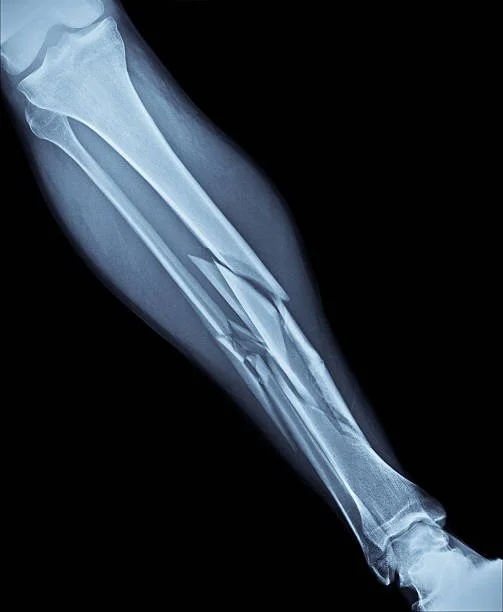Staring Down Stigmas (Part 3)
/There is a difference between recovering from a physical injury and recovering from a mental health episode.
Recovering from an injury often tends to be more straightforward: Break a bone, see it on an x-ray, get fitted for a cast, and the bone should heal properly. Get an infection, take some medicine, the symptoms should go away in a few days.
Sure, there’s no guarantee that your body will fully heal, I suppose. Injuries to ligaments, joints, tendons, etc. take different amounts of time to recover. Infections and viruses linger and sometimes worsen and spread (as we are all now well aware).
So no, this is not a perfect analogy. But I imagine it’s probably easier for many of us to understand, simply because we can often see many of these things with our own eyes and touch them with our own hands. We can see an x-ray or ultrasound, or a temperature reading on a thermometer. We can feel ourselves sweat or get the chills, our stomachs turning from not eating enough or from overindulging.
When we know something is going on with us physically, in many cases, there is a perception, an expectation, a stigma that there is such a thing as getting “back to 100 percent”. We hope that one day, we’ll be free of our illness, that we’ll no longer be sick, that we’ll have fully recovered. “Cured,” if you will.
"Recovering," in terms of mental health, to me, is much harder to measure and visualize. What does mental health look like on the outside? What does it look like to "get better"?
These things are harder to see. A person can put on a smile and go about their day, in many cases, their symptoms of anxiety, depression, bipolar disorder, etc. going undetected by those around them. Inside, though, they may be on the verge of emotional collapse, and nobody would ever even know.
via Pinterest
What does it mean to “Get Better”?
I sometimes wonder if there really is such a thing as fully “getting better” from a mental health diagnosis. Is it a mirage, a lie we tell ourselves?
Maybe. But maybe that all depends on what “getting better” even means.
What if getting better isn’t so absolute? What if it isn’t as easy as, my runny nose isn’t running any more? What if it’s not as simple as, I can run again without feeling pain in my knee? Or, my blood pressure is back down near a normal 120 over 80?
For years, I wanted my OCD to get better. For years, I thought I was getting better. And for years, I even thought I was better, or at least that I should be. 10 years of treatment should make me “all the way better,” shouldn’t it?
Well, no. But maybe, let’s look at this a different way.
Imagine looking up at the night sky and wondering what else might be out there, if other universes exist beyond the stars and planets we can see from where you stand.
Imagine staring out along a river, wondering if there’s a vast ocean beyond its shores.
Imagine standing on a desert road that goes as far as the eye can see, wondering where it leads. Or if when you get there, it will have every luxury you ever wished you could have.
via Britanica
If you traveled into space, you might not find a different universe, but a new planet.
If you sailed out on the river, you might not find an ocean, but a lake.
If you walked down the road, you might not find a bustling city with endless amenities, but instead, a quaint town with a small hotel.
Now imagine that the planet you land on has less gravity and makes you feel slightly lighter on your feet, a weight lifted.
Imagine that the lake at the end of the river is refreshing and sustains you with water to drink and food to eat.
Imagine that the hotel down the road is safe and secure, and offers a quiet place for you to rest your head and sleep.
At the very least, you might look back over your shoulder and see where you came from. You might recall things you passed along the way. And hopefully, you might recognize that you’ve made it somewhere, even if that somewhere isn’t quite where you thought it "should" be. These things weren’t what you expected, but simply what you needed to keep going.
And now, imagine that these things represent mental health…
Imagine that instead of never being depressed or anxious, you experienced these feelings less intensely or less often than you once did.
Imagine that instead of eating 5,000 calories of snacks, you were able to stop yourself from going to the kitchen, instead and taking 5 minutes to meditate or journal about why you’re stressed.
Imagine that instead of being stuck inside your house unable to shower, feed or dress yourself, you were able to put on clothes and take a walk on a nice day.
And imagine that instead of expecting to be rid of these things forever, that you were able to find ways to get through the day that you might not have been able to do before.
”A little piece of paper with a picture drawn
Floats on down the street 'til the wind is gone
And the memory now is like the picture was then
When the paper's crumpled up it can't be perfect again.”
-”Forgotten” by Linkin Park
A “Cure” for the Stigma
I believe that there is a stigma that when we seek help for our mental health, we should expect to “get better” the same way we get over a cold or heal from a broken bone. A stigma that says you shouldn't have to keep getting help indefinitely. A stigma that says that one day, you should eventually be "cured…"
This idea lived within me from the time I was 8 years old, freshly diagnosed with OCD, and well into my early 30s. For 20+ years, I felt trapped under the weight of the idea that "I should be 'better' by now"…
And then it hit me–what if “getting better” means just that? Not being cured, but actively improving. Getting better relative to the way we once were and seeing that we’ve made progress. Not getting rid of OCD, depression, binge eating, etc., but getting better at… finding, learning, and using ways to address them so that we can function in our everyday lives.
How freeing might that be? How freeing would it be to be able to say, in these terms:
"I still have depression, but I’m getting better at taking the medication I was prescribed to help lift some of that emotional weight off my shoulders."
"I still have anxiety, but I’m getting better at managing it and communicating it to others when I’m particularly stuck in the midst of an anxiety attack."
"I still binge eat, but I’m getting better at recognizing it and knowing that the next step is to seek counseling for it."
Each of these statements are 100% truthful to where I am as I write this today. I’m never going to be perfect, but I keep getting better. I have been getting better. And I plan to continue to get better at the things I need to do to live my life in spite of these struggles.
A Garden of Growth
Months ago, I made the title image for this mini-series a closeup of a flower—a play on the word "stigma". Yet now, somewhat by accident, this seems quite fitting to me actually (if I can make this analogy), that mental health is like a garden.
A garden needs to be cultivated, tended to and cared for. The overgrowth needs to be trimmed and the weeds need to be pulled to allow the plants to grow and keep the garden healthy. If we stop tending to it, caring for it, the garden can't grow and thrive.
The same goes for our mind. Our mind needs to be cultivated, tended to and cared for. When our mind gets too full, we may need to scale back, picking out the things that are holding back its growth. And just like a garden, if we stop tending to it and caring for it, it can't thrive.
Our mental health is a continuous state of existence, with some days being better than others. We try our best to use strategies that reduce the symptoms of our anxiety, depression, eating disorder, and other mental health conditions. But for many of us dealing with mental health struggles, there may be no such thing as being "fully cured."
This was not something I had ever grasped as a child. Even as an adult, it took quite some time to wrap my head around it. To this day, there are times when I wish I could experience a day without OCD.
Shedding the stigma that getting better means being cured was not easy. Knowing that there may be no cure, no time in my life in which I fully experience the total absence of my symptoms, has been one of the most difficult realizations along my mental health journey. It’s also probably been one of the most, if not the most honest realizations I’ve had.
With this, another more truthful realization has also sunk in–my OCD is here to stay. It will always be a part of me. I have to find ways to use it to help me succeed and continue working to overcome it.
Owning it
The path to living in this realization must be lit by emotional self-awareness and honesty. It is important to take a personal inventory of your feelings and anxieties and recognize what mental state you’re in. And then, rather than berating ourselves for being in that state, we can own it.
Come up with ways to navigate your struggle that feel doable for you within the context of your current state of mind. Be flexible. Not every strategy will work every time.
Make the best decision in the moment that is within what is realistic for you, not just what others want or expect of you. Doing what others want without recognizing your own self can lead you farther from where you want to be.
Take time when you need the time. The importance of self-care cannot be overstated.
Remove yourself from situations that you know throw you into a heightened state of emotional distress. This may also mean giving yourself space from certain people. Not everybody will understand this or be able to accept it. You may be called "selfish," made to feel guilty, or have others assign negative attributes to your character. Don't allow it. Anyone who tries to guilt you into putting yourself in a situation that you know will harm your mental well-being does not have your best interests at heart in that moment.
Be honest with yourself. Acknowledge your emotions. Set boundaries. State them honestly and clearly. Speak your truth, respectfully and clearly. Others may not like it, agree with it, accept it, or even know how to tolerate it. That's not your burden to carry.
And know that even though you may not be "cured," you are getting better every day.
What is your idea of “getting better”? How do you care for your mind?
Share your comments at the bottom of the page.
© Whatismyhealth













I sometimes wonder if there really is such a thing as fully “getting better” from a mental health diagnosis. Is it a mirage, a lie we tell ourselves?